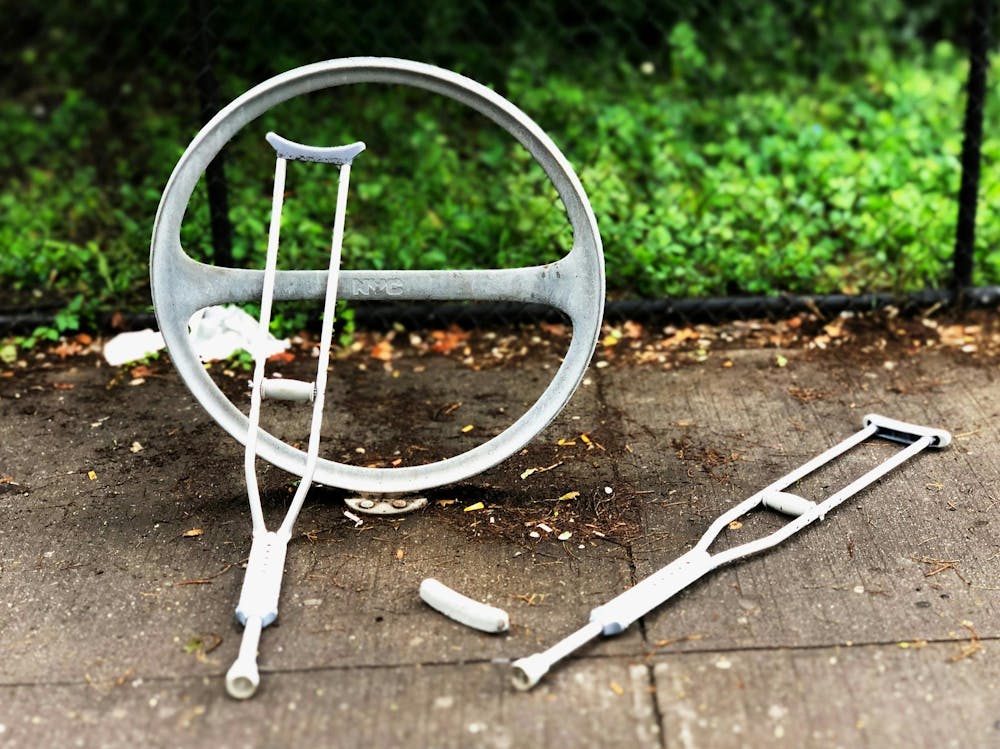This was supposed to be my semester of walking. The sidewalks were finally cleared of scooters, I had fresh new kicks equipped with arch-support inserts and a great new schedule close in proximity and diverse in location. But my days of walkable glory were numbered. And it was all thanks to one single band of tissue called the plantar fascia. After enduring the pains of plantar fasciitis for months, I believed I was invincible. That was not the case. Instead, I learned that ignoring plantar fasciitis for months has repercussions which came in the form of a partial tear in my plantar fascia.
To cure the throbbing pain in my foot, my doctor recommended a new procedure called a platelet-rich plasma injection (yes, it was as thrilling as it sounds). Sticking a needle in my heel came with a side of three days on crutches. While three days may seem like no big deal, it turned into the longest 36 hours of my college days. Thus, I spent three days feeling sorry for myself.
When I was younger, I always secretly wished I was on crutches. Maybe that desire was still buried inside me because, before the procedure, I wasn’t dreading the crutches. That lasted all of five minutes. The crutch walk from St. Liam Hall to Flaherty proved too much, and by the time I finally reached my dorm room, I collapsed on the couch and declared myself incapable of attending my next class.
Being on crutches also makes the dining hall nearly impossible. I had no free hands to carry my plate. As a result, I didn’t go to the dining hall for three days straight. While, for most students, a prolonged absence from the DH sounds like paradise, I am an avid lover of the dining hall. With each passing meal I didn’t eat at NDH, the further I fell into despair.
Instead, during my usual lunch hour, I sat on my couch watching episodes of ‘Seinfeld’ and eating pretzels that made me thirsty. Unfortunately, I was too weak to crutch myself to the water fountain. Crutching anywhere outside the confines of my room seemed like the biggest task ever, so I skipped anything that was not absolutely necessary.
The harsh reality of life on crutches at ND set in as I began the trek to my first class. As I crutched out of my dorm, the (relatively short) distance from Flaherty to DeBart felt enormous. I stared at the vast amount of sidewalk in front of me with fear. I began crutching as fast as humanly possible using a unique technique I invented which included an extra single-footed hop in between crutches. I was flying down the sidewalk, kicking up dirt in my path.
That lasted for all of ten seconds until my arms got too tired to continue. I stood there, mere feet away from my dorm, in utter defeat. The hot sun was beating down on my shaking arms. I felt hopeless. Thus began a cycle of crutching superhumanly fast for 10 seconds, followed by a 20-second break. Due to the inefficiency of my methods, the half-mile walk took me a total of 21 minutes. By the time I got to my classroom, I was a mere fragment of my previous self.
Needless to say, I wasn’t looking my best. Unfortunately, being on crutches tends to attract a lot of attention. During the times I couldn’t avoid leaving my room, I was consciously aware of the looks of concern and pity I received. By the end of the first day, I was tired of answering everyone’s questions, but also got annoyed when someone didn’t ask me what was wrong. It was a lose-lose situation. I felt like a B-list celebrity who is so over the paparazzi, but deep down understands that’s the only thing keeping them relevant.
My short stint on crutches also illuminated the slow walker problem on campus. Slow walkers come out in hordes with a single goal: to get from point A to point B as slowly as possible. No matter how close they’re cutting it to being late, they refuse to pick up their feet and walk like they have a purpose to live. The existence of slow walkers is something I have been aware of since the moment I set foot on campus, but being on crutches illuminated the extent of the problem.
I am an extremely fast walker, maybe even too fast. I had no choice. Growing up with a fast walker for a father, I had to learn to walk fast from a young age. Otherwise, I would have gotten left behind in the grocery store to freeze in the produce aisle. So I always assumed I was somewhat unfairly critical of slow walkers due to my overly speedy gait and suppressed fear of getting left behind. But on crutches, I was slow as a snail. So why, at my slowest, was I still finding myself stuck behind slow walkers? And these slow walkers were not Notre Dame class of ‘68 graduates taking a stroll down memory lane, but youthful, able-bodied students who, if this were the 1940s, would have been drafted for the army. As my travel times quadrupled, so did my anger when encountering a slow walker.
Thankfully, my three days on crutches came to an end. In the days since, I’ve spent my time basking in the freedom of the outside world, jumping for joy every time I enter the dining hall and walking at unusually fast paces to DeBart. But the memory of my three days on crutches keeps me humble with each step I take.
Allison Abplanalp is a senior finance and accounting major. If she could change one thing about the English language, she would make "a lot" one word. Her least favorite month is March because every year she is devastated when she fails to pick the perfect March Madness bracket. You can contact Allison at aabplana@nd.edu.










